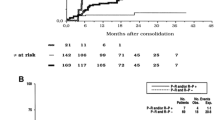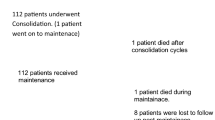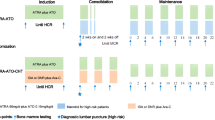Summary
All-trans retinoic acid (ATRA) and pre-upfront arsenic trioxide (ATO) have revolutionized the therapy of acute promyelocytic leukemia (APL). However, internal tandem duplication of FMS-like tyrosine kinase 3 (FLT3-ITD) mutations is associated with increased risk of relapse. The aim of this study was to analyze the prognostic impact of FLT3-ITD on APL patients who received remission induction with ATRA, idarubicin (IDA) and/or ATO, followed by ATRA plus ATO along with anthracycline, as consolidation therapy. A total of 72 patients newly diagnosed with APL were included in this study. 83.3% of the patients achieved complete remission (CR) after induction therapy. FLT3-ITD mutations were detected in 16 (22.2%) patients and closely related to bcr-3 PML-RARa transcript (P<0.001). The 5-year overall survival (OS) rate was 100% in both FLT3-ITDpositive and FLT3-ITDnegative groups, and there was no significant difference in 5-year event-free survival (EFS) between the two groups (78.3% vs. 83.3%, P=0.85). ATRA plus ATO and anthracycline-based chemotherapy achieved great outcome in newly diagnosed APL regardless of the FLT3-ITD mutation status.
Similar content being viewed by others
References
Grignani F, Ferrucci PF, Testa U, et al. The acute promyelocytic leukemia-specific PML-RAR alpha fusion protein inhibits differentiation and promotes survival of myeloid precursor cells. Cell, 1993,74(3): 423–431
Iland H, Bradstock K, Seymour J, et al. Results of the APML3 trial incorporating all-trans-retinoic acid and idarubicin in both induction and consolidation as initial therapy for patients with acute promyelocytic leukemia. Haematologica, 2012,97(2):227–234
Kayser S, Rahmé R, Martínez-Cuadrón D, et al. Outcome of older (≥70 years) APL patients frontline treated with or without arsenic trioxide-an International Collaborative Study. Leukemia, 2020,34(9):2333–2341
Breccia M, Loglisci G, Loglisci MG, et al. FLT3-ITD confers poor prognosis in patients with acute promyelocytic leukemia treated with AIDA protocols: long-term follow-up analysis. Haematology, 2013,98(12): e161–e163
Sanz J, Labopin M, Sanz MA, et al. Hematopoietic stem cell transplantation for adults with relapsed acute promyelocytic leukemia in second complete remission. Bone Marrow Transplant, 2020. doi: https://doi.org/10.1038/s41409-020-01162-0
Lam S SY, Leung AYH. Overcoming resistance to FLT3 inhibitors in the treatment of FLT3-Mutated AML. Int J Mol Sci, 2020,21(4):1537
Fan Y, Cao Y, Bai X, et al. The clinical significance of FLT3 ITD mutation on the prognosis of adult acute promyelocytic leukemia. Hematology, 2018,23(7):379–384
Gale RE, Hills R, Pizzey AR, et al. Relationship between FLT3 mutation status, biologic characteristics, and response to targeted therapy in acute promyelocytic leukemia. Blood, 2005,106(12):3768–3776
Sanz MA, Martín G, Díaz-Mediavilla J. All-transretinoic acid in acute promyelocytic leukemia. N Engl J Med, 1998,338(6):393–394
Lucena-Araujo AR, Kim HT, Jacomo RH, et al. Internal tandem duplication of the FLT3 gene confers poor overall survival in patients with acute promyelocytic leukemia treated with all-trans retinoic acid and anthracycline-based chemotherapy: an International Consortium on Acute Promyelocytic Leukemia study. Ann Hematol, 2014,93(12):2001–2010
Sanz MA, Fenaux P, Tallman MS, et al. Management of acute promyelocytic leukemia: updated recommendations from an expert panel of the European LeukemiaNet. Blood, 2019,133(15):1630–1643
Choudhry A, Deloughery TG. Bleeding and thrombosis in acute promyelocytic leukemia. Am J Hematol, 2012,87(6):596–603
Watts JM, Tallman MS. Acute promyelocytic leukemia: what is the new standard of care? Blood Rev, 2014,28(5):205–212
Baba SM, Shah ZA, Pandith AA, et al. Influence of bcr-3 PML-RARα transcript on outcome in acute promyelocytic leukemia patients of Kashmir treated with all-trans retinoic acid and/or arsenic tri-oxide. Cancer Genet, 2019,231–232:14–21
Poiré X, Moser BK, Gallagher RE, et al. Arsenic trioxide in front-line therapy of acute promyelocytic leukemia (C9710): prognostic significance of FLT3 mutations and complex karyotype. Leuk Lymphoma, 2014,55(7):1523–1532
Cumbo C, Orsini P, Anelli L, et al. FLT3Nanopore sequencing sheds a light on the gene mutations complexity in acute promyelocytic leukemia. Leuk Lymphoma, 2020:1–10
Nath S, Bhattacharyya J, Chandra P, et al. Clinicopathological significance of common genetic alterations in patients with acute promyelocytic leukemia. Hematol Oncol Stem Cell Ther, 2020, S1658–3876(20):30 121–30 127
Cicconi L, Divona M, Ciardi C, et al. PML-RARa kinetics and impact of FLT3-ITD mutations in newly diagnosed acute promyelocytic leukaemia treated with ATRA and ATO or ATRA and chemotherapy. Leukemia, 2016,30(10):1987–1992
Kumsaen P, Fucharoen G, Sirijerachai C, et al. FLT3-ITD Mutations in Acute Myeloid Leukemia Patients in Northeast Thailand. Asian Pac J Cancer Prev, 2016,17(9):4395–4399
Rasekh E, Elsayed G, Madney Y, et al. Prognostic Significance of bcr-1 and bcr-3 Isoforms of PML-RARA and FLT3-ITD in Patients with Acute Promyelocytic Leukemia. Clin Lymphoma Myeloma Leuk, 2020,20(3):156–167
Nie L, Ma R, Yuan X, et al. The prognostic value of CD2, CD4, and HLA-DR expression and FLT3-ITD mutation in adult acute promyelocytic leukemia. Leuk Lymphoma, 2020,61(10):2482–2487
Picharski GL, Andrade DP, Fabro ALMR, et al. The impact of Flt3 gene mutations in acute promyelocytic leukemia: A meta-analysis. Cancers (Basel), 2019,11(9): 1311
Breccia M, Cicconi L, Lo-Cocof. ATRA + ATO: has a new standard of care been established in low-risk acute promyelocytic leukaemia? Curr Opin Hematol, 2014,21(2):95–101
de la Serna J, Montesinos P, Vellenga E, et al. Causes and prognostic factors of remission induction failure in patients with acute promyelocytic leukemia treated with all-trans retinoic acid and idarubicin. Blood, 2008,111(7):3395–3402
Kuchenbauer F, Schoch C, Kern W, et al. Impact of FLT3 mutations and promyelocytic leukaemia-breakpoint on clinical characteristics and prognosis in acute promyelocytic leukaemia. Br J Haematol, 2005,130(2):196–202
Noguera NI, Breccia M, Divona M, et al. Alterations of the FLT3 gene in acute promyelocytic leukemia: association with diagnostic characteristics and analysis of clinical outcome in patients treated with the Italian AIDA protocol. Leukemia, 2002,16(11):2185–2189
Shih LY, Kuo MC, Liang DC, et al. Internal tandem duplication and Asp835 mutations of the FMS-like tyrosine kinase 3 (FLT3) gene in acute promyelocytic leukemia. Cancer, 2003,98(6):1206–1216
Esnault C, Rahmé R, Rice KL, et al. FLT3-ITD impedes retinoic acid, but not arsenic, responses in murine acute promyelocytic leukemias. Blood, 2019,133(13):1495–1506
Wang LN, Tang YL, Zhang YC, et al. Arsenic trioxide and all-trans-retinoic acid selectively exert synergistic cytotoxicity against FLT3-ITD AML cells via co-inhibition of FLT3 signaling pathways. Leuk Lymphoma, 2017,58(10):2426–2438
Rego EM, Pandolfi PP. Analysis of the molecular genetics of acute promyelocytic leukemia in mouse models. Semin Hematol, 2001,38(1):54–70
Sanz MA, Montesinos P, Rayón C, et al. Risk-adapted treatment of acute promyelocytic leukemia based on all-trans retinoic acid and anthracycline with addition of cytarabine in consolidation therapy for high-risk patients: further improvements in treatment outcome. Blood, 2010,115(25):5137–5146
Raffoux E, Rousselot P, Poupon J, et al. Combined treatment with arsenic trioxide and all-trans-retinoic acid in patients with relapsed acute promyelocytic leukemia. J Clin Oncolo, J Clin Oncol, 2003,21(12):2326–2334
Liu CC, Wang H, Wang WD, et al. Consolidation therapy of arsenic trioxide alternated with chemotherapy achieves remarkable efficacy in newly diagnosed acute promyelocytic leukemia. Onco Targets Ther, 2015,8: 3297–3303
Thomas X, Heiblig M. Acute promyelocytic leukemia. Cancers,2020,12(12):3718
Ghavamzadeh A, Jalili M, Rostami S, et al. Comparison of induction therapy in non-high risk acute promyelocytic leukemia with arsenic trioxide or in combination with ATRA. Leuk Res, 2018,66:85–88
Acknowledgements
The authors thank all the investigators involved in this study, including the physicians, nurses, pathologists, and laboratory technicians. What’s more, the authors also thank “Editage” for the English editing and the help from the English native speaker Ana Maria.
Author information
Authors and Affiliations
Corresponding author
Ethics declarations
The authors declare no competing interests.
Rights and permissions
About this article
Cite this article
Xu, Lw., Su, Yz. & Tao, Hf. All-trans Retinoic Acid, Arsenic Trioxide, and Anthracycline-based Chemotherapy Improves Outcome in Newly Diagnosed Acute Promyelocytic Leukemia Regardless of FLT3-ITD Mutation Status. CURR MED SCI 41, 491–497 (2021). https://doi.org/10.1007/s11596-021-2377-3
Received:
Accepted:
Published:
Issue Date:
DOI: https://doi.org/10.1007/s11596-021-2377-3




